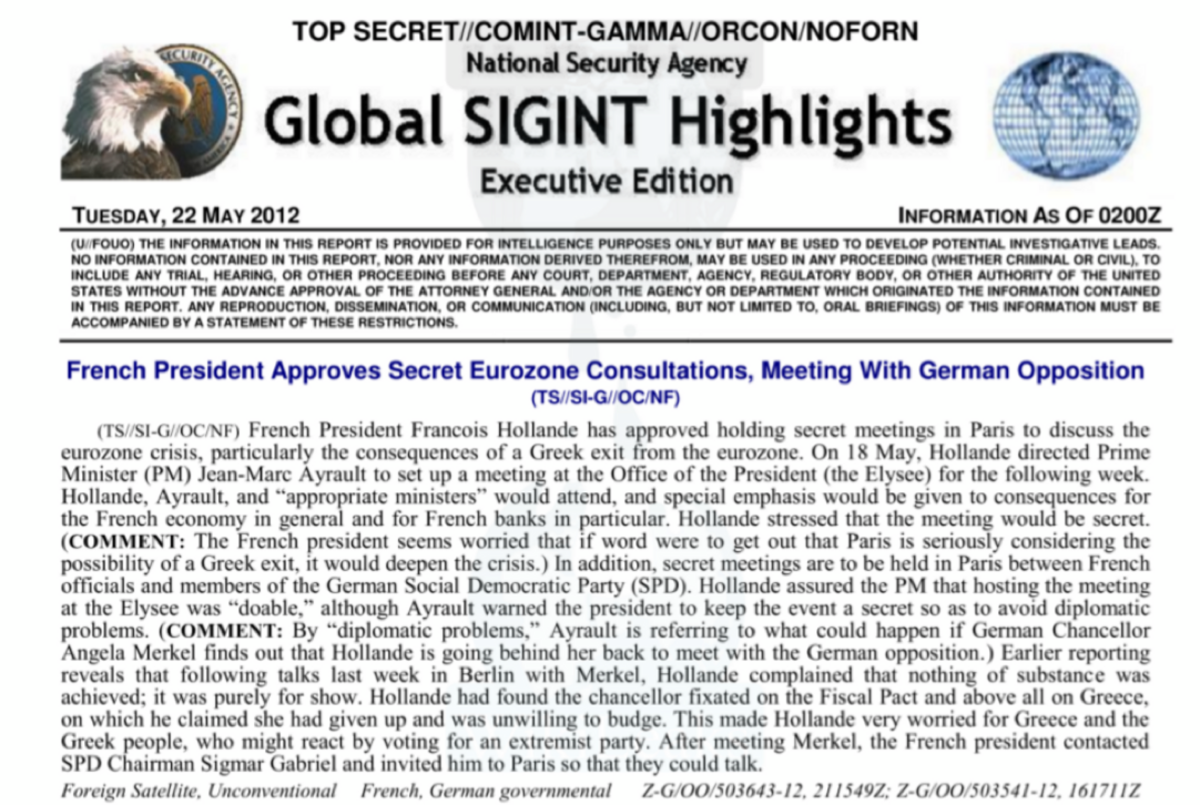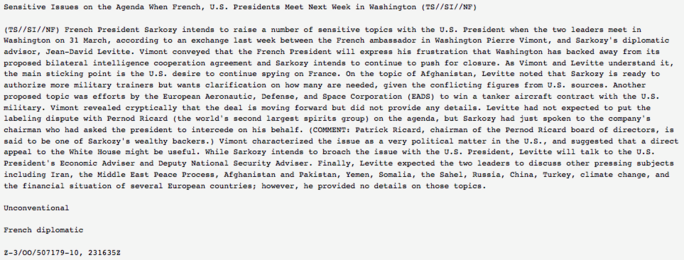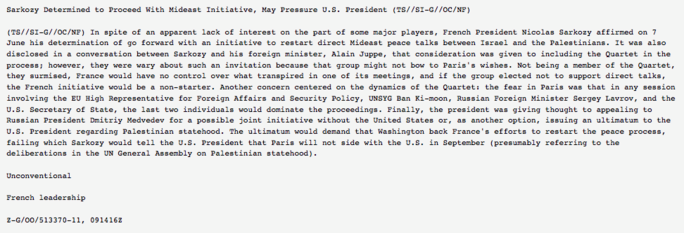For at least six years the US National Security Agency (NSA) tapped the phones of successive French presidents. The confidential transcripts and summaries of the conversations recorded are revealed here by Mediapart working with the group WikiLeaks.
All are marked “Top Secret” (TS) and “SI” for “Special Intelligence”. Of the five documents published here four are marked with a “G”, meaning they are “highly-sensitive material”. Others are marked “NF” meaning that they must absolutely not be divulged to foreign countries. Most of them are marked “unconventional” which refers to the fact that they are intercepted messages.
François Hollande May 22nd, 2012: three days in office, and already being eavesdropped
The first of these top secret notes is dated May 22nd, 2012. The title is: “French President Approves Secret Eurozone Consultations, Meeting with German Opposition,”and it relates a conversation between President François Hollande and his prime minister Jean-Marc Ayrault about the Eurozone crisis and Greece on May 18th, 2012. That is just three days after Hollande was sworn in as president of the Republic. At the time the Greek crisis was already the subject of lively discussions inside the European Union. The possibility of a so-called “Grexit” - Greek exit from the Eurozone – was mentioned, several weeks before Parliamentary elections in Greece where parties opposed to the austerity plans were already gaining support.
According to the note, Hollande and Ayrault discuss the organisation in Paris of a “secret” meeting with the leaders of the German social democrat party the SPD. The NSA reports that after his meeting with Angela Merkel, the German chancellor, on the day of his investiture on May 15th, 2012, Hollande “complained that nothing of substance was achieved; it was purely for show. Hollande had found the chancellor fixated on the Fiscal Pact and above all on Greece, on which he claimed she had given up and was unwilling to budge. This made Hollande very worried for Greece and the Greek people...”
------- Document --------

Enlargement : Illustration 1

Nicolas Sarkozy, October 30th, 2008: an all-powerful president
Three NSA reports go back to Nicolas Sarkozy's term of office (2007-2012). The first note was despatched on October 30th, 2008, though it is not at the moment clear whether the report is based on a telephone tap, intercepted messages or conversations with American sources. The NSA describe an all-powerful head of state, who is persuaded that he is the only person who can combat the global financial crisis, for which he holds the American government responsible. “..but [he] believes that Washington is now heeding some of his advice”, notes the report. “In his view it is the first time that the U.S. has not taken the lead in managing a global crisis and France will now take the helm.”
----------- Document ---------

Enlargement : Illustration 2

---------------------------
Nicolas Sarkozy, March 24th, 2010: espionage and Pernod Ricard
On March 24th, 2010, NSA sends the details of a conversation between France’s ambassador to the United States, Pierre Vimont, and Nicolas Sarkozy's diplomatic advisor at the Elysée, Jean-David Levitte. The subject: the themes that the French president wants to bring up during his meeting with President Barack Obama on March 31st. The conversation shows that Paris is perfectly aware of American espionage. “Vimont conveyed that the French President will express his frustration that Washington has backed away from its proposed bilateral intelligence cooperation agreement and Sarkozy intends to push for closure. As Vimont and Levitte understand it, the main sticking point is the U.S. desire to continue spying on France,” says the report.
Washington is also warned about Sarkozy's close interest in a labelling dispute involving French drinks company Pernod Ricard. “Levitte had not expected to put the labeling dispute with Pernod Ricard (the world's second largest spirits group) on the agenda, but Sarkozy has just spoken to the company's chairman who had asked the president to intercede on his behalf. (COMMENT: Patrick Ricard, chairman of the Pernod Ricard board of directors, is said to be one of Sarkozy's wealthiest backers)”, states the NSA.
---------- Document ---------

Enlargement : Illustration 3

Nicolas Sarkozy, June 10th, 2011: “secret” initiative on the Middle East
One June 7th, 2011, Nicolas Sarkozy telephoned Alain Juppé, his foreign minister. The president makes clear his determination to “go forward with an initiative to restart direct Mideast peace talks between Israel and the Palestinians”. The NSA report reveals that the Americans now know all about the French strategy. “Finally, the president was giving thought to appealing to Russian president Dmitriy (sic) Medvedev for a possible joint initiative without the United States or, as another option, issuing an ultimatum to the U.S. President regarding Palestinian statehood,” it reports.
------------- Document ------------

Enlargement : Illustration 4

----------------------------
Jacques Chirac, December 28th, 2006
Jacques Chirac was by now towards the end of his time in office, with just a few months left before his departure from the Elysée. His relations with the United States are tense. In the eyes of Washington he is the man who opposed the second war in Iraq in 2003. On December 23rd, 2006, the head of state discussed nominations to the United Nations with his foreign minister Philippe Douste-Blazy. The American intelligence service picks up on Chirac's lack of regard for his subordinate. “Chirac's detailed orders may be in response to the foreign minister's propensity, amply demonstrated in the past and the impetus behind a number of presidential reprimands, for making ill-times or inaccurate remarks,” says the NSA report in a commentary on the eavesdropped conversation.
------------ Document -----------

Enlargement : Illustration 5

---------------------------------------------------------------------------
- The French version of this report can be found here.
English version by Michael Streeter


